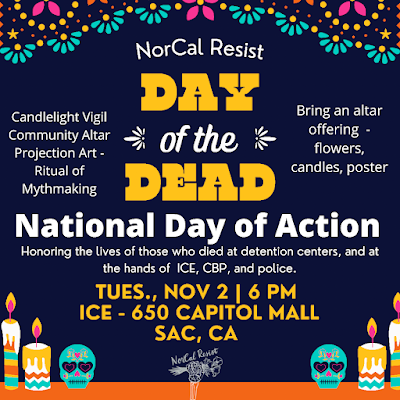Our struggle is to bring social, political, and economic justice to our nation. This is an effort of the Chicano/Mexican American Digital History Project. https://sites.google.com/site/chicanodigital/
Sunday, October 31, 2021
Thursday, October 28, 2021
The Reality Check: LARRY ITLIONG BIRTHDAY CELEBRATION IN POPLAR AND D...
Friday, October 22, 2021
Dia de los Muertos - Sacramento
Día de Los Muertos - (Day of the Dead)
October 28 & 29 (Thurs. & Fri.) 6:00 pm to 10:00 pm
October 30 (Saturday) 10:00 am to 10:00 pm
October 31 (Sunday) 8:00 am to 8:00 pm
El Panteón de Sacramento, 2700 Front Street , Sacramento CA
To participate at this event, please contact:
Presenting Organization: Latino Center of Art & Culture (916) 446-5133
“El Día de Los Muertos” (Day of the Dead) is a Mexican holiday observed on November 1st and 2nd, throughout México and around the world in other cultures. While this colorful holiday takes many forms, it always focuses on gatherings of family and friends to remember and celebrate the lives of friends and family members who have died.
Internationally, the celebration takes place on October 31, November 1 and November 2, in connection with the Triduum of Hallowtide, All Hallows’ Eve, All Saints Day, and All Souls’ Day.
In Mexican tradition, “El Día de Los Muertos” pays homage to the dearly departed by erecting and dedicating beautiful altars in their honor and paying tribute to their memory. The altars bring together photo images of the deceased, food, water and drink that they particularly enjoyed, “pan de muerto”, aromatic incense, candles, “cempaxúchitl” (marigolds), colorful artifacts and sugar skulls.
Where possible, a “desfile” (community procession) goes to the local cemetery to deliver vivid orange marigolds, beautiful marigold crosses, gifts and remembrances to the grave sites of the loved ones. It is an ancient Mexican belief that the souls of the dead have gone to a better place and that no soul likes to be thought of sadly, therefore it is common to see the procession accompanied by local people dressed as “Calacas” (skeletons), depicted as joyous figures often wearing festive clothing, dancing, and playing musical instruments to indicate a happy afterlife.
It is said that every altar should have the representation of the four elements, earth, wind, fire and water. The community strives to include these through the use of “Papél Picado” (images cut into colorful tissue) because it’s lightness and fragility reminds us of the breeze, the flowers come from and represent the earth, the candles represent fire and there is water. Many altars will have a candle for every person we wish to remember. The candle assists the loved one to see their altar, the water and food are provided to nourish them following their long journey from beyond and the incense to make their arrival pleasant.

